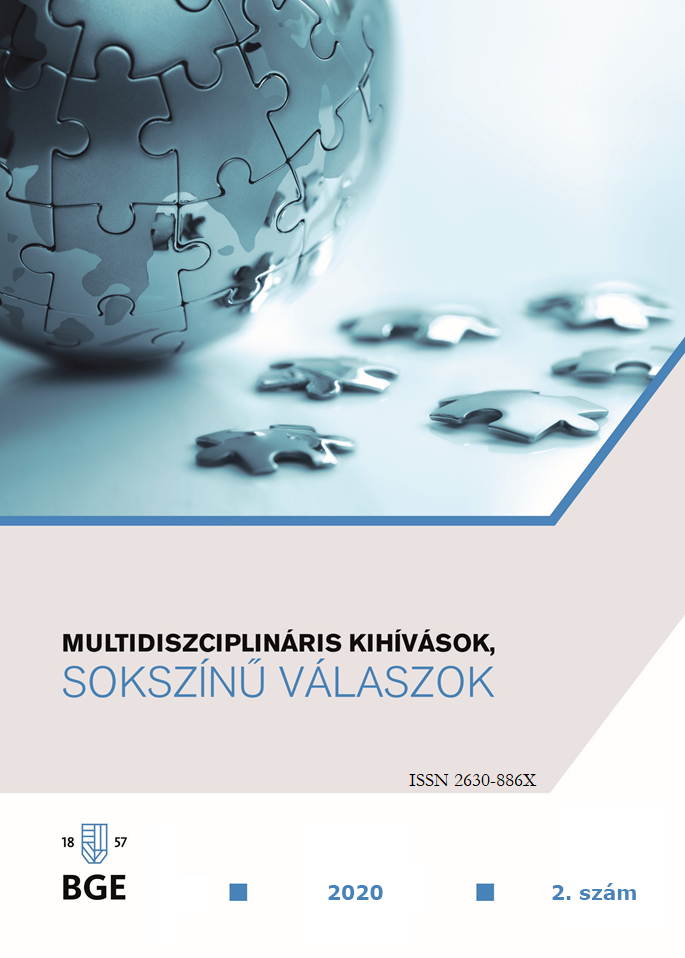Strengthening the Factor of Regional Capital Identity by the Athletes Identity
Abstract
One of the manifestations of the relationship between identity and sport is when sport strengthens community life and the community is an active member and supporter of the sport. National or regional identity is a cultural heritage. In this aspect, sports identity can be interpreted as a part of social culture. The study presents the relationship between sport and local identity and their impact on social capital. Our research aims to assess the athlete's identity and examine its impact on the social capital of an area. The question is whether integration into sport becomes an identity; and what extent would the respondents stay in / stay in sports or their region after their sports career? We examine the impact of athletes' identities on the educational and economic environment, as they form a decisive segment of training and the labor market. The attitudes of identities about sport are reflected in the capital elements that appear in the development and competitiveness of the region. Identity patterns illustrate the definition of athletes, regional, national identities and their effects on each other. Empirical research shows that the athlete's identity appears at the athletes, its effect on the territorial capital is valid as a component of territorial, social and human capital. The result of the research is a new direction in the elements of the competitiveness development mechanism, which shows the capital value of the athlete segment.
References
BÉKI P. - KERESZTESI K. (2017): A sportok királynője női szemmel. Agrártudományi Közlemények/Acta Agraria Debreceniensis(72) pp. 25-32.
BÉKI P. (2017): Sztereotípiák a sportban, avagy a női sport létjogosultsága napjaink magyar társadalmában. Acta Academiae Paedagogicae Agriensis Nova Series: SectioSport 44: pp. 171-189.
BÉKI P. - GÉCZI G. (2017): Women on ice -gender equalization. Apstract - Applied Studies In Agribusiness And Commerce11:(1-2) pp. 137-145. (2017)
BUGOVICS Z. (2010): Az elitidentiás háttere. Tér és Társadalom24. évf. 2010/2. 17-29. p., Tér és Társadalom, XXIV. évf. 2: 17-29
CAMAGNI R. (2008): Regional competitiveness. Towards a concept of territorial capital. In: Capello, R. -Camagni, R. -Chizzolini, B. -Fratesi, U. (szerk.): Modelling regional scenarios for the enlarged Europe. Springer, Heidelberg, pp. 33–46.
CAMAGNI R. (2009): Territorial capital and regional development. In: Capello, R. -Nijkamp, P. (szerk.): Handbook of regional growth and development theories. Edward Elgar, Cheltenham, Northampton, pp. 118–132.
CSEPELI Gy. (1987) Csoporttudat —Nemzettudat. Magvető Könyvkiadó, Budapest.143 p., 149.p.
DÓCZI T. (2008): Magyar sport és nemzeti identitás a globális sportszíntéren. Magyar Sporttudományi Szemle.9. évf., 36. 2008/4. 3-7.p.
EICHBERG H. (2003): Playing and Displaying Identity –About Bodily Movement, Political Ideologies and the Question of Olympic Humanism. In: Pawlucki, A. (szerk.): Postmodernity and Olympism. Academy of Physical Education and Sport, Gdansk, 57-78.
FARAGÓ B. - BÉKI P. - KONCZOSNÉ SZOMBATHELYI M. (2018): Correlation between athletic and workplace career in the competency matrix. In: Karlovitz János Tibor (szerk.): Some Recent Research from Economics and Business Studies. Komárno: International Research Institute,pp. 73–80.
FARAGÓ B. - KONCZOSNÉ SZOMBATHELYI M. (2017) Strength of region's talent retentions: strengths of athletes. In: Karlovitz J. T. (szerk.): Essays in Economics and Business Studies. Komárno: International Research Institute, pp. 113-120.
FARAGÓ B (2015): Élsportolók életpálya modelljei. Budapest: Campus Kiadó, 2015.
GIULIANOTTI R. (1999): Hooligans and Carnival Fans: Scottish Football Supporter Cultures. In: Armstrong, G. and Giulianotti, R. (szerk.): Football cultures and identities. Basingstoke; London: Macmillan & Co. 29-40
GŐSI ZS. - BUKTA ZS. (2019): Sportszövetségek a kiemelt sportágfejlesztés tükrében. Taylor: Gazdálkodás-és Szervezéstudományi folyóirat, A virtuális intézet közép-európa kutatására közleményei 36 pp. 46-55. Paper: 2019/2, 10 p. (2019) https://www.researchgate.net/publication/333702874_SPORTSZOVETSEGEK_A_KIEMELT_SPORTAGFEJLESZTES_TUKREBEN
GŐSI ZS. - SALLÓI I. (2017): Rögös út a sportkarrier: A fiatal magyar labdarúgók karrieresélyei. Magyar Sporttudományi Szemle 18:(4 (72)) pp. 11-19. (2017)
GŐSI ZS. (2017): Atipikus foglalkoztatási formák sportszervezeteknél. Köztes Európa: Társadalomtudományi Folyóirat: A Vikek Közleményei9:(1-2) pp. 137-145. (2017)
GŐSI ZS. (2018): Magyarországi iskolarendszer alapú sporttámogatások. Sport, tanulás, karrier. Neveléstudomány: Oktatás Kutatás Innováció(2) pp. 44-60. (2018)
GYÖMÖREI T. - TÓTH B. (2012): A sport piaci értéke. Győri vállalatok szponzorációs hajlandóságának vizsgálata. Magyar Sporttudományi Szemle, 13. évfolyam 51. szám, 2012/3
HORAK R. -SPITALER G. (2003): Sport Space and National Identity. Soccer and Skiing as Formative Forces: On the Austrian Example. American Behavioral Scientist, 46: 11. 1506-1518.
KONCZOSNÉ SZOMBATHELYI M. (2013): Tehetségmenedzsment, avagy a HR felelőssége. In: Róbert P.(szerk.): Gazdaság és morál: tiszta társadalom, tiszta gazdaság. Győr: Széchenyi István Egyetem Kautz Gyula Gazdaságtudományi Kar, Paper 11.
KONCZOSNÉ SZOMBATHELYI M. (2014): Tehetség-és motivációs modell kidolgozásának kérdései a Tudományos és Művészeti Diákkör kapcsán. In: Mészáros A. (szerk.): A felsőoktatás tudományos, módszertani és munkaerőpiaci kihívásai a XXI. században.Győr: Széchenyi István Egyetem, pp. 68–81.
LUKOVICS M. (2004): A regionális identitás szerepe a regionális gazdaságfejlesztésben. In: Czagány L. -Garai L. (szerk.): A szociális identitás, az információ és a piac. JATEPress, Szeged, p. 214-228.
PALKÓ K. (2011): Az identitás területi dimenziói a politika tükrében. Doktori értekezés, Pécs
RECHNITZER J. (2007): A regionális fejlődés új hajtótényezője a tudás. In: Hervainé Szabó Gy. -Szirmai V. (szerk.): Versenyképesség és várostérségi egyenlőtlenségek: Tanulmánykötet: A várostérségi egyenlőtlenségek Európában, megújulási válság és leküzdése című konferencia anyagai alapján.274 p. Komárom, Magyarország, 2006.04.28 Székesfehérvár: Kodolányi János Főiskola; MTA Veszprémi Területi Bizottság; MTA Szociológiai Kutatóintézet, pp. 33-44.
RECHNITZER J. (2016): A területi tőke a városfejlődésben: A Győr-kód. Budapest; Pécs: Dialóg Campus Kiadó, 270 p. (Studia regionum; Dialóg Campus szakkönyvek), 25 p.
RUSCIANO F. L. (2003): The Construction of National Identity: A 23-Nation Study, Political Research Quarterly, Vol. 56, No. 3 (Sep., 2003), pp. 361-366, Published by: Sage Publications, Inc. on behalf of the University of Utah, DOI: 10.2307/3219795
SZAKÁLY ZS. - LISZKAI ZS. - LENGVÁRI B. - JANKOV I. - BOGNÁR J. - FÜGEDI B. (2016): Physique, Body Composition and Aerobic Performance of Male Teacher Education Students. Studia Universitatis Babes-Bolyai Educatio Artis Gymnasticae61 : 2, June pp. 59-71. , 13 p.
VAJDA R. (2014): Munkaerőpiac, foglalkoztatás, vállalkozónők. A nők teljes értékű munkavállalásának akadályairól és esélyeiről. In: A nőtlen évek ára. Magyar Női Érdekérvényesítő Szövetség, Budapest, pp. 99-151. ISBN 978-963-08-8911-7


























